Featured Articles
Q: Why does my computer run to a disk check every time I start it up?
"Every time I turn on my laptop it does a disk check. It never used to do this before, but now it's showing up all the time, taking me a long time to boot into Windows. How do I disable the disk check progress at the start in Windows 10? Can someone help me?"
The disk check utility (CHKDSK or chkdsk.exe) is helpful for scanning and repairing hard drive problems, but it can be annoying to see disk check running on every startup when you do not need it. This post is going to teach you how to stop disk checks on startup in Windows 10 so you can skip this meaningless checking progress and directly enter the system.
| Workable Solutions | Step-by-step Troubleshooting |
|---|---|
| #1. Using Windows 10 Command Prompt | Press the Windows + X keys to bring up the context menu, and select Command Prompt (Admin) ...Full steps |
| #2. Using Windows 10 Registry Editor | Press the Windows + R keys to bring up the Run box, and type regedit...Full steps |
Two Ways to Stop Disk Check on Startup in Windows 10
Except for the cases in which Windows forces you to run a disk check because it has detected issues waiting for repair, you can decide by yourself to stop it from working on each startup in Windows 10/8/7. There are two common ways for you to follow. We'll display the guide based on the Windows 10 operating system.
#1. Using Windows 10 Command Prompt
- Press the Windows + X keys to bring up the context menu, select Command Prompt (Admin), and click in.
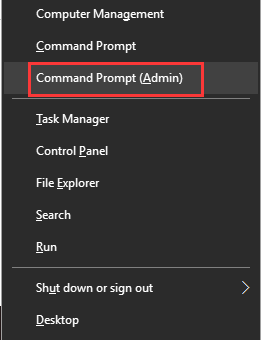
- On the Command Prompt window, type the command <chkntfs /x C:> if your target is to disable a disk check task on the C: drive.
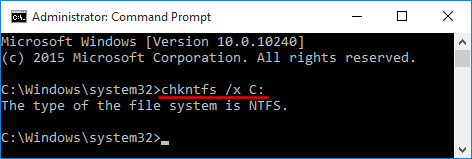
Share the two ways to let more users know about them.
#2. Using Windows 10 Registry Editor
- Press the Windows + R keys to bring up the Run box, type regedit, and click OK. This will help open Windows Registry Editor.
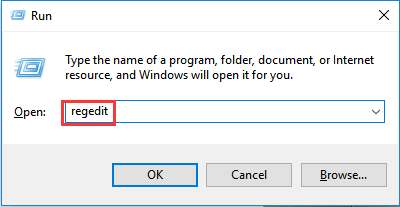
- You'll navigate to the Session Manager folder by following the path: HKEY_LOCAL_MACHINE\SYSTEM\CurrentControlSet\Control\Session Manager. Double-click on the BootExecute on the right pane. In the new "Edit Multi-String" window, delete all linds under Value data except autocheck autochk *.
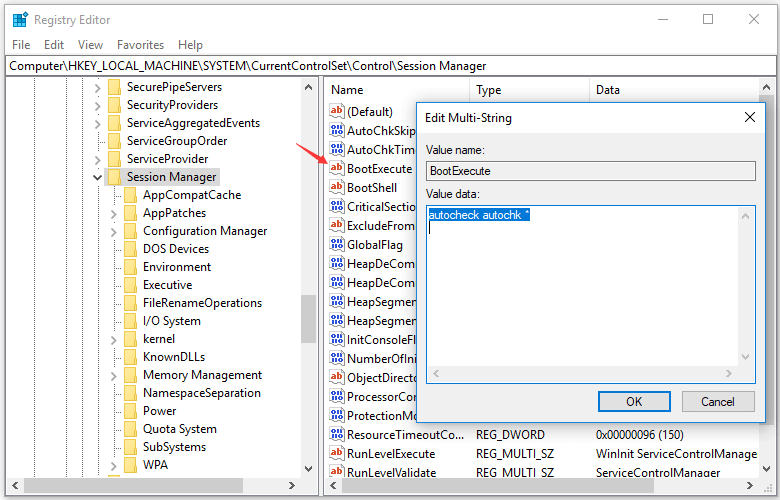
Simple & Free Windows 10 Disk Check Alternative
To run the disk check through Windows Command Prompt, and you must be very familiar with the various CHKDSK parameters and know each parameter's function as well. Are you interested in a simple yet free CHKDSK alternative that will never bother you at every startup?
EaseUS Partition Master is primarily an all-around disk and partition manager program for Windows, which allows users to take full charge of their computer hard disks and any external ones by adjusting the partition size, file system conversion, disk cloning, OS migration, etc. Its "Check partition" feature works exactly like the Windows inbuilt CHKDSK utility with regard to scanning and repairing disk errors and bad sectors it finds, and this feature is available in its free version.
Step 1. Right-click the target partition that may have a problem.
Step 2. Choose "Check" > "Check File System".
Step 3. In the Check File System window, check the "Try to fix errors if found" option by clicking the "Start" button.
Step 4. Please wait patiently. After the process, you can click the "Finish" button to exit the window.
In conclusion, the disk check running on startup usually does no harm to your computer. It can be a sign of a hard disk failure or file system corruption. It's usually necessary to execute a disk check at least once if it's first launched on a Windows startup screen. Otherwise, if every time the check disk has found nothing to repair, and it constantly starts scanning and repairing a drive before you can enter the Windows OS, use the two ways to stop it from the startup: [1] apply the chkntfs /x C: command; [2] retain only the autocheck autochk * value data in Windows Registry Editor.
For average computer users who have trouble dealing with the CHKDSK command things, it's worth downloading a free and user-friendly CHKDSK alternative software like EaseUS Partition Master for better management of disk and partitions in Windows 10/8/7.
***Common issues related to Check Disk you might encounter:
Should You Stop Auto Disk Check During Windows Startup?
When you turn on a computer, and it starts going into a session of "scanning and repairing drive (C:) xx% complete," it can be an alarm of a boot drive issue. And if it's checking the drive like D: or E, the problem can be from the data drive. If you're recently experiencing a slow computer performance, let Windows run through the checking disk from 0% to 100% complete.
If you're reluctant to execute the disk check, you can avoid it by following the message "To skip disk checking, press any key within xx second(s)." However, when you restart your computer the next time, the same message will appear on the screen again because Windows still thinks the drive needs repairing and will keep reminding you until it is checked.
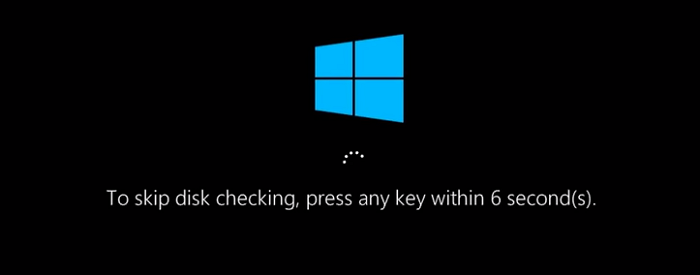
The fact is, to be frank, the disk check is not always triggered to find issues, as what we're going to mainly discuss here. Some system events and insignificant problems can evoke the utility, which usually sets to take effect at the next system reboot and the next, and the next... For example:
- Improper system shutdown
- Suspicious malware or virus infection
- Unplug any external device from the computer without safely ejecting
At this moment, an unwanted disk check that constantly comes up can be irritating. All you need to do is cancel the automatic schedule.
You can follow the two ways below to check on the startup. And if you think this passage is useful, you can share it with someone in need!
Was This Page Helpful?
Updated by Tracy King
Tracy became a member of the EaseUS content team in 2013. Being a technical writer for over 10 years, she is enthusiastic about sharing tips to assist readers in resolving complex issues in disk management, file transfer, PC & Mac performance optimization, etc., like an expert.
Daisy is the Senior editor of the writing team for EaseUS. She has been working at EaseUS for over ten years, starting as a technical writer and moving on to being a team leader of the content group. As a professional author for over ten years, she writes a lot to help people overcome their tech troubles.
Related Articles
-
How to Check SD Card Health on Windows [Safe & Efficient]
![author icon]() Sherly/Jan 29, 2026
Sherly/Jan 29, 2026 -
Windows 10 Support Ends: Not Enough Space for Windows 11 Upgrade
![author icon]() Sherly/Jan 29, 2026
Sherly/Jan 29, 2026 -
Top 9 Best Hard Drive Format Software Free Download 🏆
![author icon]() Tracy King/Jan 29, 2026
Tracy King/Jan 29, 2026 -
3 Easy Ways on How To View Partitions (2026)
![author icon]() Jean/Jan 29, 2026
Jean/Jan 29, 2026